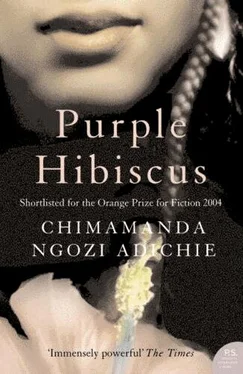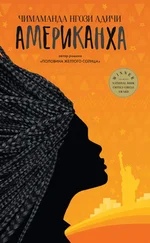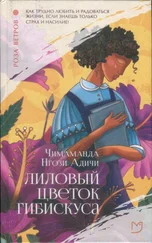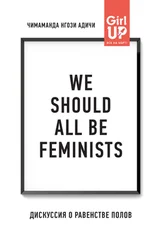Чимаманда Адичи - Purple hibiscus
Здесь есть возможность читать онлайн «Чимаманда Адичи - Purple hibiscus» — ознакомительный отрывок электронной книги совершенно бесплатно, а после прочтения отрывка купить полную версию. В некоторых случаях можно слушать аудио, скачать через торрент в формате fb2 и присутствует краткое содержание. Год выпуска: 2003, ISBN: 2003, Издательство: Algonquin Books of Chapel Hill, Жанр: Современная проза, на английском языке. Описание произведения, (предисловие) а так же отзывы посетителей доступны на портале библиотеки ЛибКат.
- Название:Purple hibiscus
- Автор:
- Издательство:Algonquin Books of Chapel Hill
- Жанр:
- Год:2003
- ISBN:1-56512-387-5
- Рейтинг книги:5 / 5. Голосов: 1
-
Избранное:Добавить в избранное
- Отзывы:
-
Ваша оценка:
- 100
- 1
- 2
- 3
- 4
- 5
Purple hibiscus: краткое содержание, описание и аннотация
Предлагаем к чтению аннотацию, описание, краткое содержание или предисловие (зависит от того, что написал сам автор книги «Purple hibiscus»). Если вы не нашли необходимую информацию о книге — напишите в комментариях, мы постараемся отыскать её.
Purple hibiscus — читать онлайн ознакомительный отрывок
Ниже представлен текст книги, разбитый по страницам. Система сохранения места последней прочитанной страницы, позволяет с удобством читать онлайн бесплатно книгу «Purple hibiscus», без необходимости каждый раз заново искать на чём Вы остановились. Поставьте закладку, и сможете в любой момент перейти на страницу, на которой закончили чтение.
Интервал:
Закладка:
"Is Papa still in bed?" I asked, but Jaja did not answer as he turned to go downstairs.
I knocked on Papa's door and opened it. He was sitting up in bed; his red silk pajamas looked disheveled. Mama was pouring water into a glass for him. "Bye, Papa," I said. He got up to hug me. His face looked much brighter than in the morning, and the rashes seemed to be clearing. "We will see you soon," he said, kissing my forehead. I hugged Mama before I left the room.
The stairs seemed delicate all of a sudden, as if they would crumble and a huge hole would appear and prevent me from leaving. I walked slowly until I got downstairs. Jaja was waiting for me at the bottom of the stairs, and he reached out to take my bag. Kevin stood by the car when we came outside.
"Who will take your father to church, now?" he asked, looking at us suspiciously. "Your father is not well enough to drive himself."
Jaja remained silent for so long that I realized he was not going to give Kevin an answer, and I said, "He said you should take us to Nsukka."
Kevin shrugged, and muttered, "This kind of trip, can't you go tomorrow?" before starting the car. He remained silent throughout the drive, and I saw his eyes often dart to us, mostly to Jaja, in the rearview mirror.
A film of sweat coated my entire body like a transparent second skin. It gave way to a dripping wetness on my neck, my forehead, underneath my breasts. We had left the back door of Aunty Ifeoma's kitchen wide open although flies buzzed in, circling over a pot of old soup. It was a choice between flies and even more heat, Amaka had said, swiping at them. Obiora was wearing a pair of khaki shorts and nothing else. He was bent over the kerosene stove, trying to get the fire to spread across the wick. His eyes were blotchy from the fumes.
"This wick has thinned so much there's nothing left to hold the fire," he said, when he finally got the fire to spread around. "We should use the gas cooker for everything now, anyway. There's no point saving the gas, since we won't be needing it for much longer."
He stretched, the sweat clinging to the outline of his ribs. He picked wp an old newspaper and fanned himself for a while, then swatted at some flies.
"Nektva! Don't knock them into my pot," Amaka said. She was pouring bright reddish-orange palm oil into a pot.
"We shouldn't be bleaching any more palm oil. We should splurge on vegetable oil for these last few weeks," Obiora said, still swatting at the flies.
"You sound like Mom has already gotten the visa," Amaka snapped. She placed the pot on the kerosene burner. The fire snaked around to the side of the pot, still a wild orange, spewing fumes; it had not yet stabilized to a clean blue.
"She will get the visa. We should be positive."
"Haven't you heard how those American embassy people treat Nigerians? They insult you and call you a liar and on top of it, eh, refuse to give you a visa," Amaka said.
"Mom will get the visa. A university is sponsoring her," Obiora said.
"So? Universities sponsor many people who still don't get visas."
I started to cough. Thick white smoke from the bleaching palm oil filled the kitchen, and in the stuffy mix of the fumes and heat and flies, I felt faint.
"Kambili," Amaka said. "Go to the verandah until the smoke blows out."
"No, it's nothing," I said.
"Go, biko!"
I went to the verandah, still coughing. It was clear that I was unused to bleaching palm oil, that I was used to vegetable oil, which did not need bleaching. But there had been no resentment in Amaka's eyes, no sneer, no turndown of her lips. I was grateful when she called me back later to ask that I help her cut the ugu for the soup. I did not just cut the ugu, I made the garri also. Without her still eyes bearing down on me, I did not pour in too much hot water, and the garri turned out firm and smooth. I ladled my garri onto a flat plate, pushed it to the side, and then spooned my soup beside it. I watched the soup spreading, seeping in underneath the garri. I had never done this before; at home, Jaja and I always used separate dishes for garri and soup.
We ate on the verandah, although it was almost as hot as the kitchen. The railings felt like the metal handles of a boiling pot. "Papa-Nnukwu used to say that an angry sun like this in rainy season means that a swift rain will come. The sun is warning us of the rain," Amaka said, as we settled down on the mat with our food. We ate quickly because of the heat, because even the soup tasted like sweat. Afterward, we trooped to the neighbors' flat on the topmost floor and stood on their verandah, to see if we could catch a breeze. Amaka and I stood by the railings, looking down.
Obiora and Chima squatted to watch the children playing on the floor, clustered around the plastic Ludo board and rolling dice. Somebody poured a bucket of water on the verandah and the boys lay down, with their backs on the wet floor. I looked out at Marguerite Cartwright Avenue below, at a red Volkswagen driving past. It revved loudly as it went over the speed bump, and even from the verandah, I could see where the color had faded to a rusty orange.
I felt nostalgic as I watched the Volkswagen disappear down the street, and I was not sure why. Maybe it was because it revved like Aunty Ifeoma's car sometimes did, and it reminded me that very soon, I would not see her or her car anymore. She had gone to the police station to get a statement, which she would take to her visa interview at the American embassy to prove that she had never been convicted of a crime. Jaja had gone with her.
"I suppose we won't need to protect our doors with metal in America," Amaka said, as if she knew what I was thinking about. She was fanning herself briskly with a folded newspaper.
"What?"
"Mom's students broke into her office once and stole exam questions. She told the works department that she wanted metal bars on her office doors and windows, and they said there was no money. You know what she did?" Amaka turned to look at me; a small smile at the edges of her lips. I shook my head. "She went to a construction site, and they gave her metal rods for free. Then she asked Obiora and me to help her install them. We drilled holes and fit the rods in with cement, across her windows and doors."
"Oh," I said. I wanted to reach out and touch Amaka. "And then she put up a sign at her door that said exam questions ARE IN the bank." Amaka smiled and then started to fold and refold the newspaper. "I won't be happy in America. It won't be the same."
"You will drink fresh milk from a bottle. No more stunted tins of condensed milk, no more homemade soybean milk," I said.
Amaka laughed, a hearty laugh that showed her gap. "You're funny."
I had never heard that before. I saved it for later, to ruminate over and over that I had made her laugh, that I could make her laugh.
The rains came then, pouring down in strong sheets that made it impossible to see the garages across the yard. The sky and rain and ground merged into one silver-colored film that seemed to go on and on. We dashed back to the flat and placed buckets on the verandah to catch the rainwater and watched them fill rapidly. All the children ran out to the yard in their shorts, twirling and dancing, because this was clean rain, the kind that did not come with dust, that did not leave brown stains on clothes. It stopped as quickly as it had started, and the sun came out again, mildly, as if yawning after a nap. The buckets were full; we fished out floating leaves and twigs and took the buckets in.
I saw Father Amadi's car turning into the compound when we went back out to the verandah. Obiora saw it, too, and asked, laughing, "Is it me or does Father visit more often whenever Kambili is here?" He and Amaka were still laughing when Father Amadi came up the short flight of stairs. "I know Amaka just said something about me," he said, sweeping Chima into his arms. He stood backing the setting sun. The sun was red, as if it were blushing, and it made his skin look radiant. I watched how Chima clung to him, how Amaka's and Obiora's eyes shone as they looked up at him. Amaka was asking him about his missionary work in Germany, but I did not hear much of what she said. I was not listening. I felt so many things churning inside me, emotions that made my stomach growl and swirl. "Do you see Kambili bothering me like this?" Father Amadi asked Amaka. He was looking at me, and I knew he had said that to include me, to get my attention.
Читать дальшеИнтервал:
Закладка:
Похожие книги на «Purple hibiscus»
Представляем Вашему вниманию похожие книги на «Purple hibiscus» списком для выбора. Мы отобрали схожую по названию и смыслу литературу в надежде предоставить читателям больше вариантов отыскать новые, интересные, ещё непрочитанные произведения.
Обсуждение, отзывы о книге «Purple hibiscus» и просто собственные мнения читателей. Оставьте ваши комментарии, напишите, что Вы думаете о произведении, его смысле или главных героях. Укажите что конкретно понравилось, а что нет, и почему Вы так считаете.






![О Генри - Пурпурное платье [The Purple Dress]](/books/405339/o-genri-purpurnoe-plate-the-purple-dress-thumb.webp)





